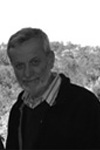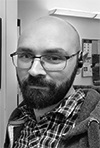principles of fluorescence techniques
april 17-20, 2023 | urbana-champaign, il
Dr. Beniamino Barbieri | ISS, Inc. | President | 1602 Newton Dr. | Champaign, IL 61822 | USA | Tel: 217-359-8681 | beniamino.barbieri@iss.com
Prof. Stephen A. Boppart | Beckman Institute for Advanced Science and Technology | University of Illinois at Urbana-Champaign | 405 North Mathews Avenue | Urbana, IL 61801 | Tel: (217) 333-8598 | boppart@illinois.edu
Prof. Boppart graduated from the University of Illinois at Urbana-Champaign (UIUC) in 1990 with a B.S. in Electrical Engineering and an option in Bioengineering. Continuing at UIUC, he completed his M.S. in Electrical Engineering in 1991, where he developed microfabricated multi-electrode arrays for neural recordings. From 1991 to 1993, at the Air Force Laser Laboratory in San Antonio, Texas, he conducted research on laser-tissue interactions in the eye, helping establish national laser safety standards. Prof. Boppart then went on to MIT, receiving his Ph.D. in 1998 in Medical and Electrical Engineering. His doctoral studies included the development of optical coherence tomography in Prof. Jim Fujimoto's laboratory. As part of a joint program between MIT and Harvard, Prof. Boppart completed his M.D. from Harvard Medical School in June 2000. Currently, Prof. Boppart is a full professor with appointments in the Departments of Electrical and Computer Engineering, Bioengineering, and Medicine at UIUC. He is Head of the Biophotonics Imaging Laboratory at the Beckman Institute for Advanced Science and Technology and along with a team of 25 researchers, is investigating novel optical diagnostic imaging technologies for basic science and translational clinical applications. From 2006-2008, he served as Founding Director of the Mills Breast Cancer Institute, and holds a joint position with Carle Foundation Hospital and Carle Clinic Association in Urbana, Illinois. His efforts included constructing a new building and developing new infrastructure to support translational research and technology development in breast cancer research between UIUC and Carle Foundation Hospital. Currently he is initiating efforts to direct a campus-wide Illinois Imaging Initiative intended to leverage the strengths and diversity of over 100 faculty working in all aspects of imaging science, technology, and application.
Prof. Enrico Gratton | University of California, Irvine | Department of Biomedical Engineering | Irvine, CA 92697-2715 | USA | Tel: 949-824-2674 | egratton22@yahoo.com
Enrico Gratton was born in Merate (Como) Italy. He received his doctorate degree in physics from the University of Rome in 1969. From 1969 to 1971 he was a post-doctoral fellow at the Istituto Superiore di Sanità in Italy. He went to the University of Illinois at Urbana-Champaign (UIUC) in 1976 and began his work as a research associate in the Department of Biochemistry. In 1978 he was appointed assistant professor in the Department of Physics at UIUC. In 1989 he was promoted to professor. Dr. Gratton's laboratory has reached international recognition for the development of instrumentation for time-resolved fluorescence spectroscopy using frequency domain methods.
In 1986 Dr. Gratton was awarded a grant from the National Institutes of Health, National Center for Research Resources, to establish the first national facility dedicated to fluorescence spectroscopy: the Laboratory for Fluorescence Dynamics (LFD). In 2006 the entire LFD laboratory moved to its current location at the new Natural Sciences II building at the University of California, Irvine. Dr. Gratton remains Principal Investigator of the LFD and holds joint appointments as Professor in the UCI departments of Biomedical Engineering and Physics and in the College of Medicine. The facility is a state-of-the-art fluorescence laboratory for use by local, national, and international scientists. It has a dual and equal commitment to research and development of fluorescence instrumentation and theory and to service in a user-oriented facility. Dr. Gratton's research interests are varied and many; they include design of new fluorescence instruments, protein dynamics, hydration of proteins, and I.R. spectroscopy of biological substances. Dr. Gratton has authored or co-authored over 400 publications in refereed scientific journals.
Prof. Joseph Irudayaraj | University of Illinois at Urbana-Champaign | Founder Professor in Bioengineering | 3102 Micro & Nanotechnology Lab | jirudaya@illinois.edu
Dr. Irudayaraj has a background in biological engineering and computer sciences. The basis for his work stems from a multidisciplinary background and skills developed in the fields of engineering, biosciences, and computer sciences. He is the Founder Professor of Bioengineering at UIUC. Prior to UIUC, he has held faculty positions at Purdue University, The Pennsylvania State University, and Utah State University. His group has extensively published in biosensors, single cell dynamics, and nanotechnology applied to human health and biosecurity. They are interested in developing smart therapeutics - drug delivery for hypoxia and immunotherapy, single cell analysis of epigenetic regulation, epigenetic regulation and PFAS toxicology to understand cellular processes and disease mechanisms for cancer.
Prof. David M. Jameson | University of Hawaii at Manoa | Department of Cell and Molecular Biology | John A. Burns School of Medicine | Honolulu, HI 96822 | USA | Tel: 808-956-5034 | Website | djameson@hawaii.edu
A student of the late Prof. Gregorio Weber, David Jameson is Full Professor in the Department of Cell and Molecular Biology at the University of Hawaii. Prof. Jameson's research interests are focused on the development and application of time-resolved and steady-state fluorescence methodologies to elucidate dynamic aspects of biomolecules, including proteins, nucleic acids and membrane systems.
Currently, his laboratory is investigating several protein systems, including dynamin, a large (98kDa) GTPase which functions to "pinch-off" membrane vesicles in pathways such as receptor mediated endocytosis and synaptic vesicle recycling. This research involves both in vitro and in vivo studies on the self-association modes of dynamin as well as its interaction with membranes and other proteins such as endophilin and Arc. His lab also has a project on Botulinum Neurotoxin funded by Allergan, Inc. This project involves biophysical studies on proteins forming the neurotoxin complex as well as development of in vitro and in vivo toxin assays based on fluorescence fluctuation spectroscopy.
Author of more than 130 peer-reviewed articles, Prof. Jameson regularly reviews grants for the American Heart Association, the National Institutes of Health and the National Science Foundation. His research has been supported by grants from the National Institutes of Health, the National Science Foundation and the American Heart Association.
Dr. Lorenzo Scipioni | University of California, Irvine | lscipion@uci.edu







